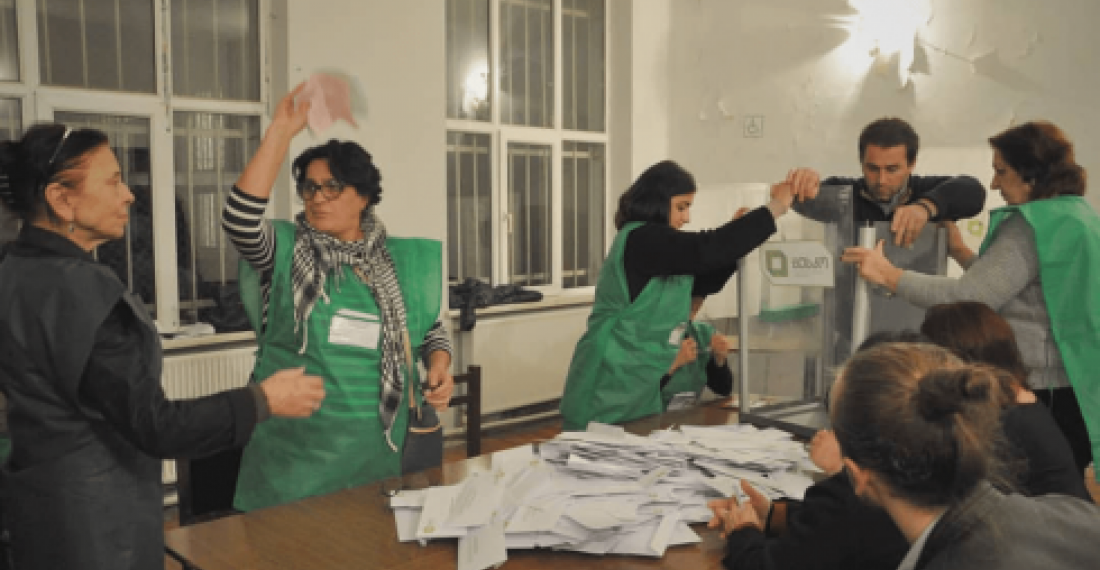Updated
Exit polls say Zurabishvili won the Georgian presidential election
An exit poll conducted by Edison Research has indicated that Salome Zurabishvili, the candidate supported by the ruling georgian Dream party has won the second round of the presidential election, securing 55% of the votes cast. Another exit poll, by Imedi TV show Zourabishvili leading with 58% of votes cast
Polling closed at 20.00 local time, and counting is expected to go throughout the night
--
Voter participation in the second round of the Georgian presidential elections appears to be considerably higher than in the first round. Data released by the Central Elections Commission indicates that by 15.00 local time 38/8% of voters had cast their vote. This is considerably higher than the number of voters in the first round by the same time, which was 30.98%.
Commonspace.eu political editor said in a comment that after a bitterly fought election campaign the Georgian people are now having their say for the second time. During the election campaign ahead of the second round several commentators had mentioned that a high voter turnout in the second round would favour the pro government candidate, Salome Zurabishvili. Many supporters of the ruling Georgian Dream (GD) party had stayed away during the first vote on 28 October, resulting in a surprisingingly close result. According to these commentators many of those who stayedf away during the first round were enticed to cast their ballot in the second round by the stark choice between the GD candidate and the candidate of the United National Movement. This however is speculation, and it will be some hours yet before we know what the choice of the georgian people has been.
---
Preliminary figures released by the Georgian Central Elections Commission indicate a higher turnout than in the first round, with 19.6% voting by midday, about 3% higher.
Elections are taking place in Georgia on Wednesday (28 November) to choose the country's new president. In the first round of the elections held on 28 October none of the candidates won the necessary 50% of the votes cast. Voting has been taking place largely peacefully, with both government and opposition accusing each other of infringements.
President Giorgi Margvelashvili and prime minister Mamuka Bakhtadze both voted early, at the same time appealing to vioters to go and vote. "For some it is a difficult choice, but I want to call on every citizen of Georgia to come to the polls and make a choice", president Giorgi Margvelashvili said after he cast his vote.
"I would like to congratulate Georgian citizens on today's turnout, which I see at the polling station. I am glad and proud that the Georgian voters express their position so actively. For some it is a difficult choice, but I want to call on every citizen of Georgia to come to the polls and make a choice and play a decisive role in forming a government. Thank you for such turnout and I am sure this will continue throughout the day, which guarantees that the elections will be held at the high level and there will be fewer violations," Margvelashvili said.
In the meantime the central Elections Commission said all polling stations opened on time, at 08:00 am and the voting process is underway across Georgia. There are 3,703 polling stations, including 55 abroad. The total number of voters is 3,528,658. In the first two hours of polling 7.26% of voters cast their vote, slightly higher than at the same time in the first round.
related content on the first round of the elections: Georgia's presidential election (live blog)
After a bruising election campaign, considered amongst the most nasty in recent Georgian history, voters will choose between the candidate backed by the ruling Georgian Dream party, Salome Zurabishvili, and the candidate of the United National Movement, who is also backed by a number of other opposition parties, Grigol Vashadze. The two candidates came neck and neck in the first round, each securing around 38% of the votes cast.
related content: Georgian election goes to second round
Whilst the position of president is largely ceremonial the election has turned into a test of strenght and will between Georgia's current ruling party led by Bidhizina Ivanishvili, and the main opposition force that identifies with the country's former president, Mikheil Saakashvili.
source: commonspace.eu






